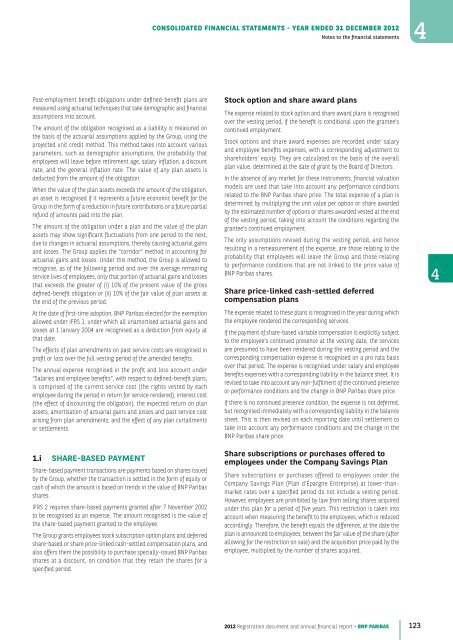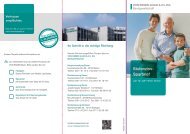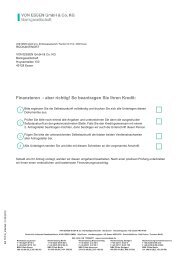2012 Registration document and annual financial report - BNP Paribas
2012 Registration document and annual financial report - BNP Paribas
2012 Registration document and annual financial report - BNP Paribas
- No tags were found...
You also want an ePaper? Increase the reach of your titles
YUMPU automatically turns print PDFs into web optimized ePapers that Google loves.
CONSOLIDATED FINANCIAL STATEMENTS - YEAR ENDED 31 DECEMBER <strong>2012</strong>Notes to the <strong>financial</strong> statements4Post-employment benefit obligations under defined-benefit plans aremeasured using actuarial techniques that take demographic <strong>and</strong> <strong>financial</strong>assumptions into account.The amount of the obligation recognised as a liability is measured onthe basis of the actuarial assumptions applied by the Group, using theprojected unit credit method. This method takes into account variousparameters, such as demographic assumptions, the probability thatemployees will leave before retirement age, salary inflation, a discountrate, <strong>and</strong> the general inflation rate. The value of any plan assets isdeducted from the amount of the obligation.When the value of the plan assets exceeds the amount of the obligation,an asset is recognised if it represents a future economic benefit for theGroup in the form of a reduction in future contributions or a future partialrefund of amounts paid into the plan.The amount of the obligation under a plan <strong>and</strong> the value of the planassets may show significant fluctuations from one period to the next,due to changes in actuarial assumptions, thereby causing actuarial gains<strong>and</strong> losses. The Group applies the “corridor” method in accounting foractuarial gains <strong>and</strong> losses. Under this method, the Group is allowed torecognise, as of the following period <strong>and</strong> over the average remainingservice lives of employees, only that portion of actuarial gains <strong>and</strong> lossesthat exceeds the greater of (i) 10% of the present value of the grossdefined-benefit obligation or (ii) 10% of the fair value of plan assets atthe end of the previous period.At the date of first-time adoption, <strong>BNP</strong> <strong>Paribas</strong> elected for the exemptionallowed under IFRS 1, under which all unamortised actuarial gains <strong>and</strong>losses at 1 January 2004 are recognised as a deduction from equity atthat date.The effects of plan amendments on past service costs are recognised inprofit or loss over the full vesting period of the amended benefits.The <strong>annual</strong> expense recognised in the profit <strong>and</strong> loss account under“Salaries <strong>and</strong> employee benefits”, with respect to defined-benefit plans,is comprised of the current service cost (the rights vested by eachemployee during the period in return for service rendered), interest cost(the effect of discounting the obligation), the expected return on planassets, amortisation of actuarial gains <strong>and</strong> losses <strong>and</strong> past service costarising from plan amendments, <strong>and</strong> the effect of any plan curtailmentsor settlements.1.i SHARE-BASED PAYMENTShare-based payment transactions are payments based on shares issuedby the Group, whether the transaction is settled in the form of equity orcash of which the amount is based on trends in the value of <strong>BNP</strong> <strong>Paribas</strong>shares.IFRS 2 requires share-based payments granted after 7 November 2002to be recognised as an expense. The amount recognised is the value ofthe share-based payment granted to the employee.The Group grants employees stock subscription option plans <strong>and</strong> deferredshare-based or share price-linked cash-settled compensation plans, <strong>and</strong>also offers them the possibility to purchase specially-issued <strong>BNP</strong> <strong>Paribas</strong>shares at a discount, on condition that they retain the shares for aspecified period.Stock option <strong>and</strong> share award plansThe expense related to stock option <strong>and</strong> share award plans is recognisedover the vesting period, if the benefit is conditional upon the grantee’scontinued employment.Stock options <strong>and</strong> share award expenses are recorded under salary<strong>and</strong> employee benefits expenses , with a corresponding adjustment toshareholders’ equity. They are calculated on the basis of the overallplan value, determined at the date of grant by the Board of Directors.In the absence of any market for these instruments, <strong>financial</strong> valuationmodels are used that take into account any performance conditionsrelated to the <strong>BNP</strong> <strong>Paribas</strong> share price. The total expense of a plan isdetermined by multiplying the unit value per option or share awardedby the estimated number of options or shares awarded vested at the endof the vesting period, taking into account the conditions regarding thegrantee’s continued employment.The only assumptions revised during the vesting period, <strong>and</strong> henceresulting in a remeasurement of the expense, are those relating to theprobability that employees will leave the Group <strong>and</strong> those relatingto performance conditions that are not linked to the price value of<strong>BNP</strong> <strong>Paribas</strong> shares.Share price-linked cash-settled deferredcompensation plansThe expense related to these plans is recognised in the year during whichthe employee rendered the corresponding services.If the payment of share-based variable compensation is explicitly subjectto the employee’s continued presence at the vesting date, the servicesare presumed to have been rendered during the vesting period <strong>and</strong> thecorresponding compensation expense is recognised on a pro rata basisover that period. The expense is recognised under salary <strong>and</strong> employeebenefits expenses with a corresponding liability in the balance sheet. It isrevised to take into account any non-fulfilment of the continued presenceor performance conditions <strong>and</strong> the change in <strong>BNP</strong> <strong>Paribas</strong> share price.If there is no continued presence condition, the expense is not deferred,but recognised immediately with a corresponding liability in the balancesheet. This is then revised on each <strong>report</strong>ing date until settlement totake into account any performance conditions <strong>and</strong> the change in the<strong>BNP</strong> <strong>Paribas</strong> share price.Share subscriptions or purchases offered toemployees under the Company Savings PlanShare subscriptions or purchases offered to employees under theCompany Savings Plan (Plan d’Épargne Entreprise) at lower-thanmarketrates over a specified period do not include a vesting period.However, employees are prohibited by law from selling shares acquiredunder this plan for a period of five years. This restriction is taken intoaccount when measuring the benefit to the employees, which is reducedaccordingly. Therefore, the benefit equals the difference, at the date theplan is announced to employees, between the fair value of the share (afterallowing for the restriction on sale) <strong>and</strong> the acquisition price paid by theemployee, multiplied by the number of shares acquired.4<strong>2012</strong> <strong>Registration</strong> <strong>document</strong> <strong>and</strong> <strong>annual</strong> <strong>financial</strong> <strong>report</strong> - <strong>BNP</strong> PARIBAS 123





